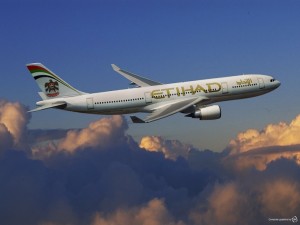Etihad Airways continued its growth in the first quarter of 2012 with a 28% rise in revenue to US$989 million over the corresponding period in 2011 and passenger numbers increasing by 500,000 to 2.4 million.

President and Chief Executive James Hogan said: “We met all our revenue targets and budget estimates in the first quarter, despite the challenging economic conditions confronting the international community. Despite the tough economic times, we believe our business model of organic network growth combined with codeshare partnerships and strategic equity investments will enable us to continue to prosper and ensure sustainable profitability.”
The record results were announced as James Hogan unveiled plans for a significant expansion of the airline’s global network over the next 18 months. These include a daily service to Etihad Airways’ first South America destination and a new service to Vietnam. The South American flights will begin mid next year with details of the first destination now being finalised.
Etihad also plans to introduce additional frequencies to a range of other destinations in Asia and Australia. Etihad Airways commenced a service from Abu Dhabi to Jomo Kenyatta International Airport in Nairobi, Kenya, this week and will also reach into West Africa with the introduction of flights to Nigeria in July 2012.
James Hogan added: “Our seat factor hit a record high but yields, particularly in the premium cabins, remain a challenge.”
Etihad now has a network across 84 cities in 54 countries and will take delivery of three new Airbus A320s and four new Boeing B777s in 2012, with the first three-class B777-300ER deployed on the London route from July. The carrier’s fleet will have grown to 71 aircraft by year’s end.
Escalating fuel costs had a major impact on the aviation sector during the quarter. “Fuel prices are our largest variable cost and they are tracking higher than 2011,” he said. “We remain committed to an active fuel hedging strategy – 80% of our first quarter’s fuel costs were hedged and we currently have 74% of fuel costs hedged for the rest of 2012.”



